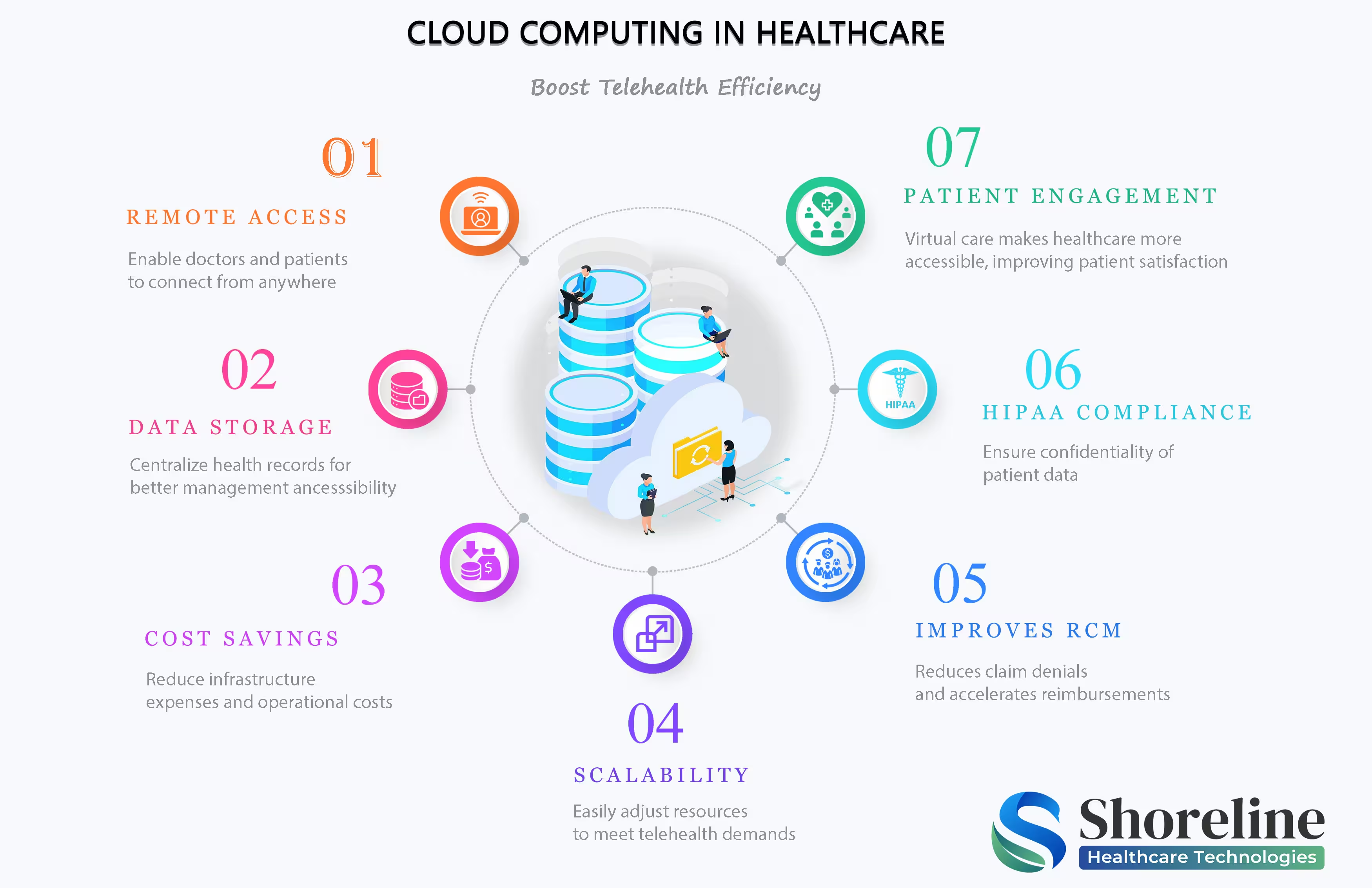Cloud Computing in Healthcare: Boost Telehealth Efficiency
With virtual care and remote monitoring on the rise, those old-school on-site IT setups just can't keep up anymore. There is a need for a flexible, strong foundation that handles huge amounts of patient info instantly and safely. Cloud computing provides you with this platform to conduct virtual visits, instantly access EHRs, and process claims without geographical or hardware limitations. Providers can deliver remote services with ease by moving medical records, billing tools, and patient details to the cloud and stay compliant with HIPAA, refine their RCM processes, and cut down on their overhead. Switching to the cloud lets you conduct smooth online appointments, delight patients with better experiences, and keep your revenue flowing steadily. In this blog let us see how cloud computing is revolutionizing telehealth and making it more accessible, secure, and cost-effective.
Why US Healthcare is Embracing Cloud-Based Telehealth?
Providers continue to use telehealth services even after pandemic because of their long-term benefits. Cloud computing serves as the backbone of telehealth.
- ✔ They power video consultations and provide secure messaging.
- ✔ Prescriptions and lab results can be made available online for patients.
- ✔ Offers interoperability between hospitals, clinics, laboratories and pharmacies.
- ✔ It helps providers to access patient medical records when working remotely thereby improving the care quality.
According to the report by The Centers for Medicare & Medicaid Services (CMS) adoption of telehealth services surged over 60% during COVID-19 and they still remains as a vital source for rural areas and patients with chronic diseases. And without cloud technology, telehealth encounters several hurdles:
- ✔ Limited access to real-time patient data
- ✔ High operational and IT infrastructure costs
- ✔ Security risks when transmitting PHI
- ✔ Inefficient billing and claim submission processes
Cloud computing solves these barriers by giving providers a reliable, compliant, and cost-effective backbone to deliver virtual care while integrating directly into revenue cycle management. At Shoreline Healthcare Technologies, we integrate cloud-enabled billing workflows that allow providers to manage their telehealth claims, reduce denials, and accelerate reimbursement.
What benefits does Cloud Technology offer in Telehealth?
Cloud-based environment offers several benefits in telehealth services like real-time access to patient data from any device, integrated billing that speeds up the revenue cycle and easy scalability options to handle more virtual visits without the need for extra hardware. It also boosts patient engagement through apps for appointment scheduling and reminders.

Seamless Access of Patient Data
With clous based EHRs providers can securely access complete patient history from any device, helping them to take informed decisions during telehealth visits.
Improves Revenue Cycle Management (RCM)
Cloud platforms can integrate with billing systems, to improve coding accuracy, reduce claim denials and expedite with all payer requirements.
Scalability
Allows clinics and hospitals to handle multiple virtual visits without the need of additional hardware.
Enhanced Patient Engagement
Cloud-based apps give patients appointment reminders, prescription, and lab result access.
Cost Savings
Eliminates infrastructure expenses while improving operational efficiency.
HIPAA Compliance and Cloud Security in Healthcare
Healthcare data is highly sensitive and protecting them has always been one of the biggest concerns while adopting any new technologies. Providers must always comply with the Health Insurance Portability and Accountability Act (HIPAA) and any violations to this may result in severe legal consequences. Cloud computing abides by this compliance and fortifies data security by
- Encrypts data before storing and transmitting.
- Multi-Factor Authentication to prevents unauthorized access.
- Audit Logs record data access and maintain accountability.
- Business Associate Agreements (BAAs) to ensure cloud service providers follow all federal and state-specific regulations.
It was noted that the average cost of a data breach in US reached a record $10.22 million in 2025, from 9.2% in 2024, due to higher regulatory fines and detection costs. (Source: IBM, Cost of a Data Breach Report 2025). By choosing the HIPAA-compliant cloud systems, providers can significantly reduce the risks of such breaches and penalties.
CMS and Other Regulatory Considerations
Compliance is non-negotiable in healthcare billing. Providers must keep a watch on the
- ✔ Annual CMS Telehealth Codes updates which may include new covered services and place-of-service changes.
- ✔ All vendors must sign a Business Associate Agreements (BAA) for handling the PHI.
- ✔ Telehealth billing requirements differ by state keep yourself equipped with State-wise Medicaid Variations
Best Practices for Cloud-Enabled Telehealth Billing
- ✔ Use HIPAA-compliant cloud platforms for telehealth visits.
- ✔ Ensure coding teams are trained on latest CMS updates.
- ✔ Monitor payer-specific rules for telehealth coverage.
- ✔ Use analytics dashboards to track claim performance.
- ✔ Partner with RCM experts like Shoreline Healthcare Technologies to reduce denials.
We at Shoreline Healthcare Technologies, helps providers to make a smooth transition to the cloud-based environment. Our complete RCM services include cloud migration support, customized billing automation, and ongoing compliance checks. Our tailored solutions suit for all whether be it a solo practitioner or a multi-speciality hospital. We help to improve your telehealth offerings and tighten your revenue cycle. We've helped countless clients reduce denial rates by 20-30% through cloud-integrated tools, turning potential losses into steady income.
FAQs
Q1. How does cloud computing improve telehealth billing?
+Cloud Platforms integrates directly with billing systems, thereby reduces the occurrence of errors, speeds up the process of claim submission, and increase the rates of approval.
Q2. Are cloud-based telehealth services secure?
+Yes. Cloud services provide HIPAA-compliant encryption, and controls access levels to protect sensitive patient data.
Q3. What is Digi Health?
+Digi health refers to the use of technologies like cloud computing, AI, IoT, and telemedicine to improve patient’s outcomes, and increase operational efficiency.
Q4. What is a Business Associate Agreement (BAA)?
+A BAA is a legal contract required under HIPAA between a healthcare provider and any vendor who handles patient information. It is to ensure that the vendor protects patient data and follow HIPAA rules.
Q5. Is ShorelineMB the same as Shoreline Healthcare Technologies?
+Yes, ShorelineMB.com is the official website of Shoreline Healthcare Technologies, a leading provider of medical billing and RCM services.
















Contact Shoreline Healthcare Technologies to scale your telehealth practices.